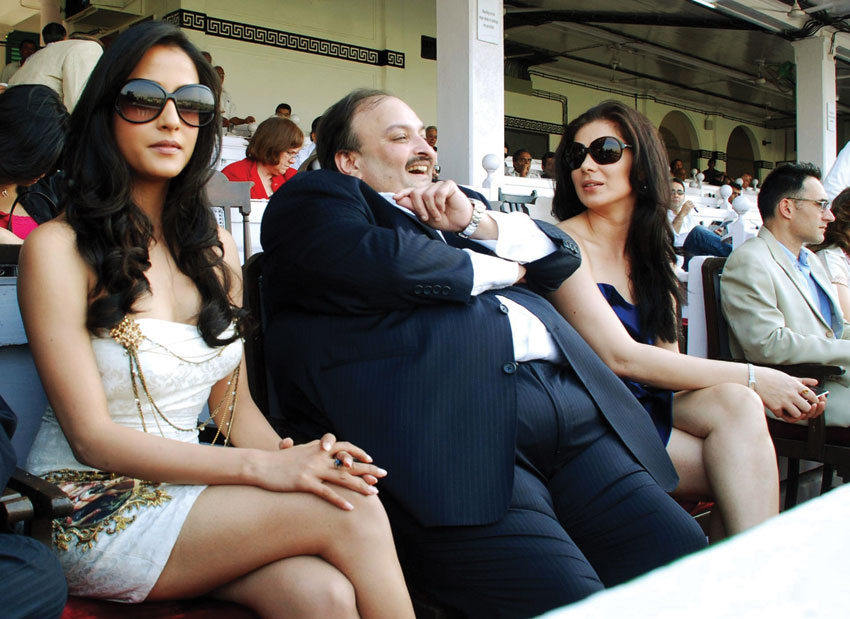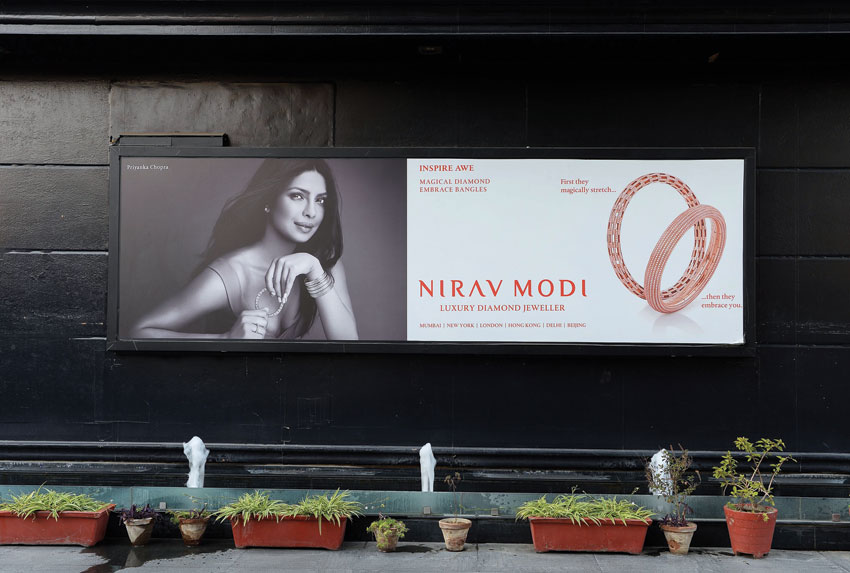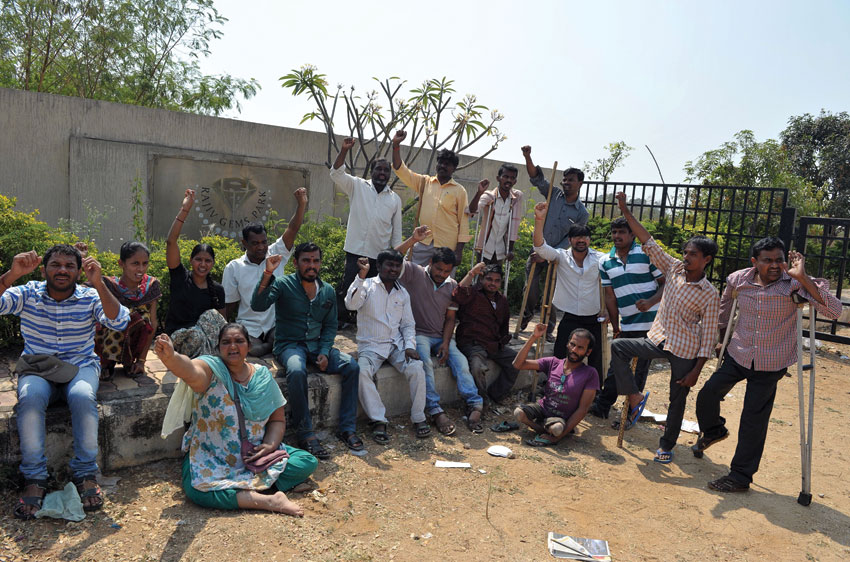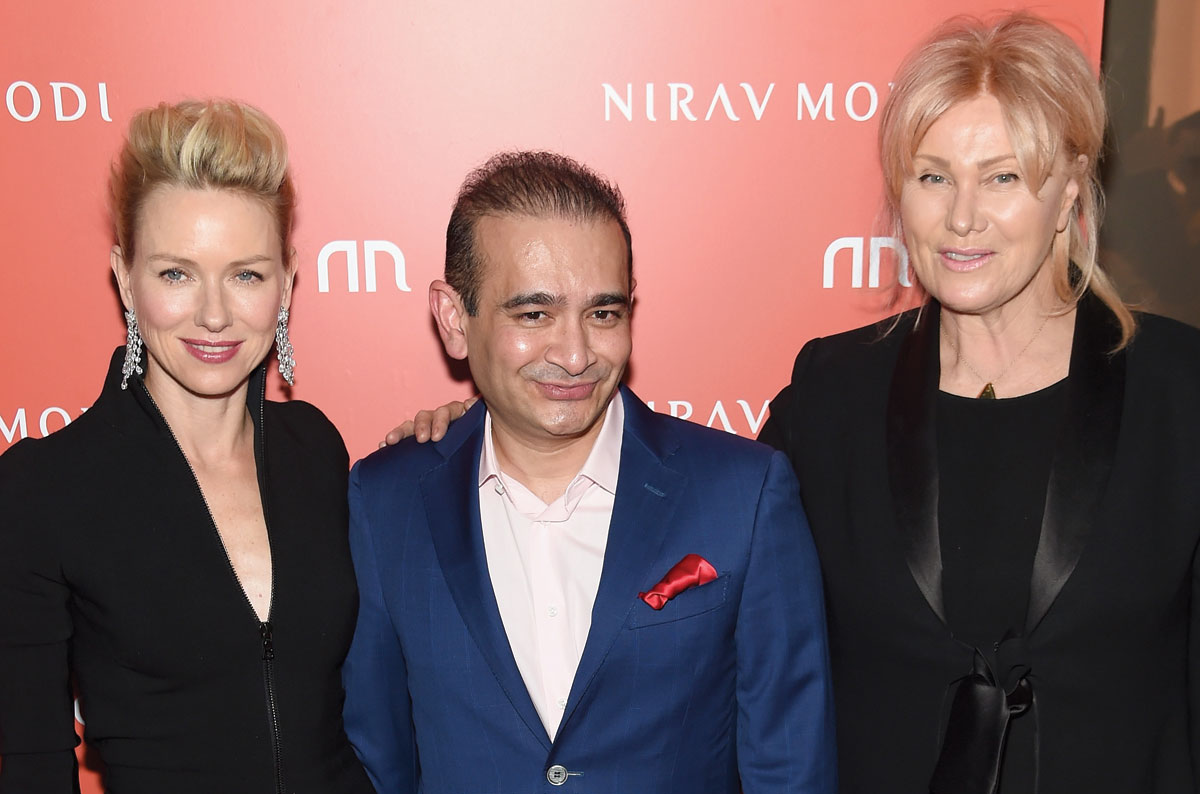Chasing NIMO: Diamantaire Rocks India’s Banking System
File photo of (l-r): Naomi Watts, Nirav Modi and Deborra-Lee Furness at the U.S. boutique grand opening of Nirav Modi Boutique, Sept. 8, 2015, in New York City. (Jamie McCarthy/Getty Images)
India was shell-shocked when on Valentine’s Day, India’s second biggest state-run bank, Punjab National Bank announced that it had been duped by an international diamantaire (one who buys, polishes and sells diamonds) and jeweler, Nirav Modi, who runs eponymous stores from New York to Beijing, of not less than $1.8 billion, writes Priyanka Bhardwaj.
The biggest ever fraud committed in the banking history of the country comes at a time when the national economy is burdened by bad loans of just the national banks amounting to Rs. 7,300 billion which is a whopping 370 percent increase since March 2013, when the number stood at Rs. 1,500 billion.
The initial fraud report filed by the PNB with the Reserve Bank of India (RBI) and Central Bureau of Investigation (CBI) details how Nirav, owner of Solar Exports, Stellar Diamonds, and Diamond R US, and his uncle Mehul Choksi, proprietor of the Gitanjali Group, Gili India, Asmi and Nakshatra, deceived the PNB and caused a loss of Rs. 2.8 billion ($43 million).
A closer investigation unearthed an embezzlement of not less than $1.77billion that was conducted with the active collusion of junior employees at the Brady House branch in Mumbai of the PNB.
These employees had issued fraudulent “letters of undertaking” (LoUs), foreign letters of credits (FLCs) and inland letter of guarantees sans any margin money as security and without the firms of the fraudsters obtaining any pre-approved credit limit.

Using LoUs and at times FLCs in favor of foreign suppliers, the accused firms raised short-term credit from overseas branches of other Indian banks.
It was in mid-January when representatives of the accused firms presented a set of import documents to the Brady House branch requesting buyers’ credit to pay overseas suppliers.
When these firms declined to submit collateral for the full amount as demanded by bank officials, citing previous transactions that were carried out without pre-arranged credit limit, the fraud unraveled – that the illicit transactions were the handiwork of two junior employees who had issued LOUs over the SWIFT (The Society for Worldwide Interbank Financial Telecommunication) interbank messaging system and not entered any of these transactions on the bank’s system, and without the furnishing of any documents of import or approvals from the competent authority.
Due to the disparate existence of the SWIFT system, and the core banking system run on Infosys Finacle software, in the instance of PNB, the fraud, believed to have started in 2011, remained undetected.
The state bank informs that specific officials at foreign branches of other Indian banks that extended credit are also under the scanner for collaboration in this illicit proceeding.

Nirav, who along with his family is absconding, has denied any wrong doing by issuing a letter through his lawyer stating that his firms owed “substantially less” than the total exposure reported by PNB and has tried to build a case of being hounded by blaming the bank for destroying his business and brand.
In fact, his audacious and reputedly belligerent lawyer compares Nirav Modi’s case to 2G and Bofors cases and insists that the case against Modi too shall collapse due to “lack of credible evidence.”
Meanwhile, Choksi, also evading Indian authorities, has written an open letter to his employees, maintaining his innocence and advising them to look for other jobs, due to his inability to pay up salaries as his assets stand seized by the authorities.
So far, the CBI has arrested twelve people – six from the bank and six from Modi and Choksi’s companies, but not any ‘big fish’ or any of the absconders despite an Interpol notice against them.
The government’s financial anti-crime wing, the Enforcement Directorate, has announced seizure of diamonds and jewelry worth 56.74 billion rupees ($875 million), attachment of properties, home and offices, and luxury assets of Modi.
For now, the PNB has suspended 10 employees, demanded documents from its overseas branches, and sixteen more banks.
Though many banks that have extended loans based on the PNB guarantees would want PNB to pay up, the PNB maintains that “all transactions are contingent in nature and it is ready to honor bona fide commitments.”
In a Feb. 12 “caution notice” addressed to CEOs of 30 banks, it stated that other banks too needed to shoulder the responsibility in the blame as they too “overlooked” certain Indian central bank rules and has asked Modi to respond with a “concrete and implementable” repayment plan.

The RBI too has come down heavily upon the banks to ensure their SWIFT system was integrated with their main banking software by April 30.
In the face of the current imbroglio stricter adherence to government guidelines will be of moot significance.
There can be no denying that the current scandal has eroded the credibility of Prime Minister Narendra Modi’s slogans of “minimum government and maximum governance,” and promises of “na khaoonga, na khaane doonga” (neither will I be corrupt nor will I allow corruption).
In this context India’s ranking of 79th from last year that has slipped to 81st in Transparency International’s Global Corruption Perception Index 2017 cannot be missed.
While spokespersons of the government have been calling out at the Congress for allowing the scam to originate in their tenure, the Finance Minister has not been able to utter anything concrete besides homilies for introspection among auditors, short of even a monitoring system of the quality of auditing when it genuinely faults or willfully abjures responsibility.
Considering the possibility of many high-profile skeletons in this closet, it is up for debate if the guilty will be punished or Nirav Modi and Choksi will evade Indian authorities like liquor baron Vijay Mallya and IPL cricket’s ex-honcho Lalit Modi.
It is common knowledge that political entities and businessmen’s cozy relationship have been the cause for the country’s financial irregularities and scams, and this crony capitalism is not an easy boat to rock.
The diminution of brand Nirav Modi may be certain as its ulra-elite clientele that is sensitive to bad press may shift loyalties but the negative impact on the Indian diamond business that employs over 1.2 million people and has exports worth $23 billion through decades of hard-work fears loss of image and confidence from lending institutions and clients.
However, this scam has presented the government a golden opportunity to clear its stand of staying committed to cracking down on offenders and for which an electoral dividend in 2019 General elections is not far away.
The government is believed to be coming up with a very tough new law — the Fugitive Economic Offenders Bill — to impound and sell assets of Nirav Modi – type escapees, a move that will allow quicker recovery of dues through a special court from absconding and non-convicted corporate defaulters.
Last September, the Union Law Ministry had approved the draft of Fugitive Economic Offenders Bill, 2017, and its passage into law is now being fast tracked.
The purview of the Bill is slated to be Rs. 1 billion and more and makes provisions for a court of law—a “Special Court” under the Prevention of Money Laundering Act to declare a person a “fugitive economic offender.”


